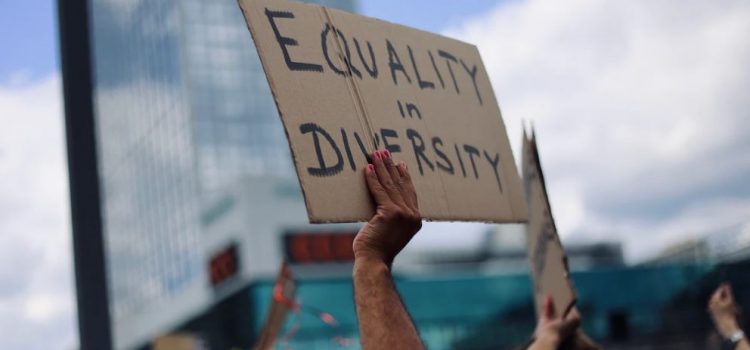
This is a free excerpt from one of Shortform’s Articles. We give you all the important information you need to know about current events and more.
Don't miss out on the whole story. Sign up for a free trial here .
Why are DEI programs becoming controversial? Do DEI programs even work? What are the arguments being posed against them?
Some states are banning Diversity, Equity, and Inclusion (DEI) initiatives, and some companies face boycotts or criticism for implementing them. However, others claim that DEI programs are essential to maintaining cognitive diversity and fair practices.
Below we’ll discuss arguments for and against DEI programming, and consider what might be done differently.
DEI Programs Are Facing Backlash
Diversity, Equity, and Inclusion (DEI) programs have become an increasingly controversial topic in recent years. These programs aim to promote diversity in institutions like schools, the government, and workplaces, by recognizing and valuing differences in race, ethnicity, gender, age, religion, disability, and sexual orientation. “Equity” refers to ensuring that everyone has equal access to opportunities and resources. And “Inclusion” means creating an environment where everyone feels welcome and valued.
But some states have been dismantling DEI initiatives in public institutions, due to concerns about the effects and costs, and there have been protests over DEI programs in companies.
What Exactly Are DEI Initiatives?
How do DEI programs create a more diverse, equitable, and inclusive environment? They can take many forms and vary depending on the organization and its specific needs. But some common practices included in DEI initiatives are:
- Collecting data: Institutions usually gather information to determine areas that need improvement.
- Providing training: Companies often create training programs to educate employees on topics such as “cultural humility” (self-reflection), bias, and appreciation for diversity.
- Revising policies: Administrators and managers might review institutional policies and procedures to identify problem areas and implement anti-discrimination policies and practices that promote equal opportunities for all employees.
- Reorganizing: Companies may evaluate and revamp their organizational structure to ensure diverse representation in their management and leadership positions, and to more actively include diverse perspectives in decision-making.
The Importance of Cognitive Diversity
According to Matthew Syed in his book Rebel Ideas, groups that more fully cover the problem space are more collectively intelligent—in other words, they’re better versed to understand and solve difficult problems. For this reason, Syed argues that cognitive diversity—the range of insights, ideas, and viewpoints represented in a group—is the main factor that determines collective intelligence.
Syed concedes that groups of more-intelligent members will be more collectively intelligent, all else being equal. However, if these members all share the same ideas and perspectives, they’ll suffer from knowledge clustering: Their knowledge will overlap substantially, creating a group that’s scarcely more intelligent than any individual member.
Therefore, Syed concludes that we can’t determine collective intelligence by adding up each member’s knowledge, as that would overvalue homogeneous groups. Rather, he argues that collective intelligence depends on the differences in what group members know. For this reason, groups that are cognitively diverse have greater collective intelligence.
Moreover, Syed argues that we fail to see the benefits of cognitive diversity because we suffer from perspective blindness: We struggle to recognize our own perspective and its blind spots and thus don’t appreciate the importance of other perspectives.
Arguments Against DEI Initiatives
Some lawmakers have been targeting DEI efforts in states across the country. So far in 2023, more than 30 bills have been introduced in an attempt to eliminate these programs in public institutions.
In May, Texas state legislators passed a ban on DEI initiatives at publicly funded colleges and universities, calling DEI initiatives “racial profiling.” This follows Florida Gov. Ron DeSantis’s bill prohibiting public education institutions from spending money on any DEI initiatives.
The American Conservative outlines the most common objections to DEI initiatives, which tend to be based around a few criticisms:
- They undermine meritocracy: This argument rests on the claim that companies that invest in DEI initiatives end up promoting employees based on their race, sex, or other “DEI-privileged” characteristics, rather than on their skill and competence.
- They cause resentment and division: Many claim that these initiatives purposefully serve to make white employees uncomfortable and afraid to challenge anything a non-white person says, for fear of being labeled racist.
- They’re a waste of money: Some opponents assert that, at best, DEI initiatives are an unnecessary expense, and they do nothing but assuage white liberal leaders’ guilt.
- They ignore class inequality: In college admissions, DEI-based policies can overlook socioeconomic status, which can actually be the biggest barrier to success.
Arguments in Favor of DEI Initiatives
On the other hand, supporters of DEI argue that research shows these initiatives really do contribute toward fairer practices within institutions, pushing the country in the direction of a more just and equitable society. But they contend that institutions can and should take measures to guard against the criticisms levied against these programs. For example, DEI programs should:
- Educate majority group members: Advocates of DEI initiatives argue that the above criticisms are based on fear by majority group members that equality for minority groups threatens their own status and merit. Leaders must begin by educating majority group members about why DEI initiatives are necessary and benefit everyone.
- Create a focus on belonging for everyone: Institutions should ensure that everyone’s voice is heard and respected. DEI isn’t about privileging any category, but equalizing all identity categories and creating a cooperative environment.
- Allow for mistakes: Leaders should take care to not create a “victim or villain” atmosphere, where some employees feel afraid to do or say the wrong thing simply because of their identity categories. People should be allowed to make mistakes and correct them.
- Be transparent: Making salaries public knowledge within an organization allows everyone to see the company structure and how various roles are filled and compensated.
What’s Next for DEI?
Democratic leaders worry that the bans in states like Florida and Texas could have negative repercussions for colleges, including on the ability to attract and retain students from diverse backgrounds and to acquire grant funding. The Texas Conference of American Association of University Professors said in a statement that the Texas ban “sends the message that our state is not committed to welcoming students from all backgrounds and to building a public higher education system that is truly inclusive and supportive of all.”
Moving forward, public and corporate institutions may need to consider revising their approaches to DEI, to combat some of the defensive reactions these programs tend to trigger.

Want to fast-track your learning? With Shortform, you’ll gain insights you won't find anywhere else .
Here's what you’ll get when you sign up for Shortform :
- Complicated ideas explained in simple and concise ways
- Smart analysis that connects what you’re reading to other key concepts
- Writing with zero fluff because we know how important your time is






